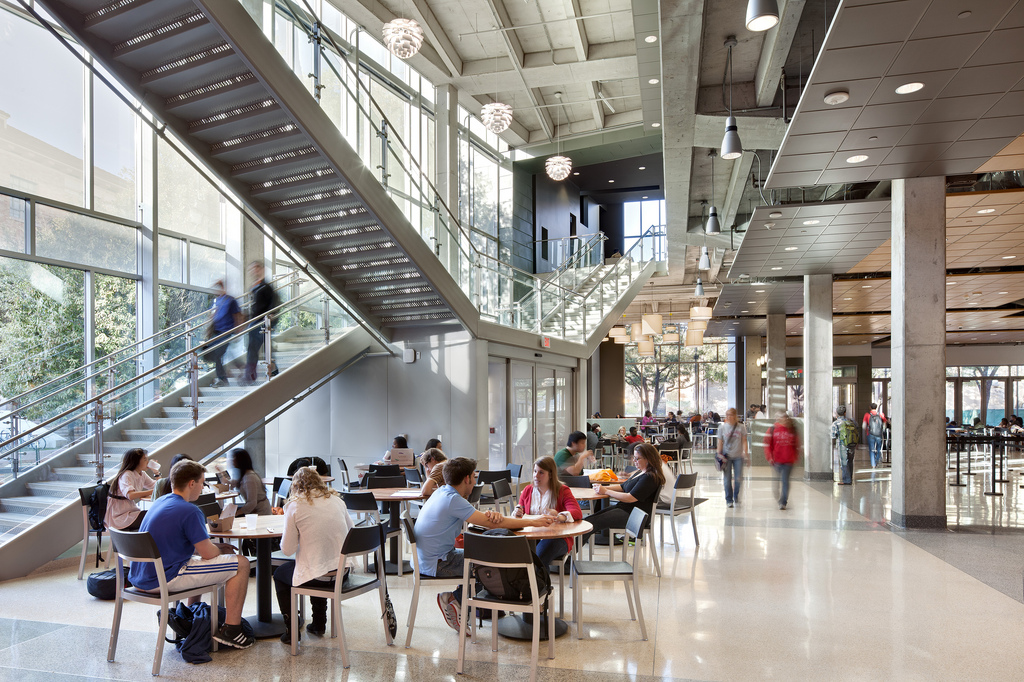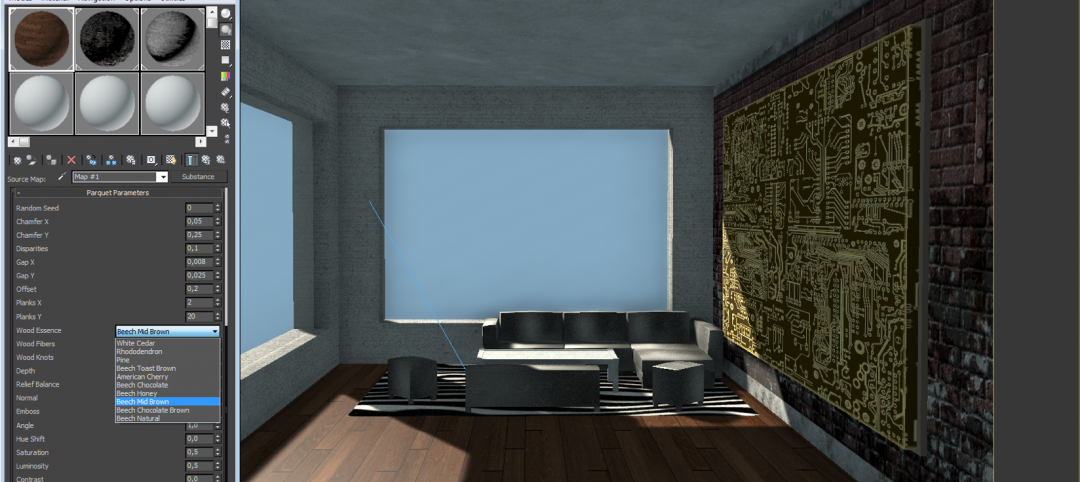AUSTIN, TEXAS, March 22, 2011 – The new Student Activity Center (SAC) at the University of Texas campus in Austin is of the students, by the students, and for the students. The SAC is the result of almost 60 years of student lobbying for another dedicated social and cultural center on campus. Located in the heart of the campus, this 149,000 square foot facility is designed to serve as the “campus living room” – it is a place for students “to see and be seen”. The facility should earn a LEED Gold certification, a first for the campus.
Extensive student input and design workshops generated the main project goals, which were easy accessibility, more activity spaces and overall sustainability. Overland Partners Architects of San Antonio, TX and associate architect WTW Architects of Pittsburgh, PA responded with a contemporary building on the East Mall of campus, the primary pedestrian point of entry to the campus. The new SAC is geographically and functionally complementary to the existing student union on the West Mall, and important in serving the growing student body.
To meet the student goal of dedicated activity spaces, the SAC includes a 5,000 square foot ballroom, a 500-seat auditorium, a black box theatre, 12 student conference/meeting rooms, student organization offices, and a student government chamber. The ballroom is already booked for months with events like comedian Zach Braff, a 3-D Gaming tournament, and a concert by Chuck D. and Common. There are also ample group study lounges and informal individual study areas scattered throughout the facility. An indoor food court featuring regional fast food favorites and a coffee bar sits adjacent to more than 46,000 square feet of landscaped outdoor gathering space, substantially increasing the seating and providing an enjoyable dining experience in the moderate Austin climate.
The new SAC has struck a powerful chord at the university in response to project goals.
“I have to say that a mark of any successful building is how it makes one wonder how we managed without it,” Juan González, Vice-President for Student Affairs, said. “It is truly a major enhancement to not only the area, but the whole campus environment. It is especially rewarding to see so many students embrace the facility from the moment we opened the doors.”
The SAC is a modern take on the traditional campus architecture. The simple forms and clean lines of the SAC distinguish it, yet the limestone walls and red tile roofs unify it with the existing campus buildings. Tucked behind a mature oak grove, abundant windows throughout the building bring in ample daylighting and take advantage of the surrounding landscape. There is an accessible rooftop courtyard with an adjacent green roof, and a cistern that collects and recycles rainwater for landscape irrigation.
Renowned international artist James Turrell is designing a skyspace installation for the SAC opening in fall 2012. The enclosed rooftop space will have an opening in the roof surrounded by LED lights that will affect the viewer’s perception of the sky.
The project has only been open since January, yet students are already using every available inch of space. Early student reviews of the SAC are glowing.
“I went to peak at the new structure, and OH MAN. It’s awesome. Though we have the Union, academic center, and library, UT always lacked a central place where students could take a break between places, grab a bite to eat, nap, cram for a test, or hold student org meetings. The SAC provides all of the above and with style,” according to one UT student blog.
About Overland Partners
Overland Partners Architects, founded in 1987 in San Antonio, Texas, is the realization of a vision to bring together a wide range of talents in architecture and planning in order to provide comprehensive design services. Sensitive to the environmental and aesthetic contexts of its projects, the firm strives for a thoughtful integration of technology, art, and craft through highly sustainable solutions. Overland Partners offers its clients the ultimate goal of creating beautiful, functional and enduring designs through a collaborative process that inspires long-term relationships. In addition to the Student Activity Center at the University of Texas the firm is currently working on the university’s new College of Liberal Arts. The firm completed the Lady Bird Johnson Wildflower Center at the University of Texas in Austin, winner of more than 10 regional and national design awards. Other higher education projects within the firm’s design portfolio include the new Business School Building at Baylor University in Waco, Texas; the new Academic Building at the University of North Texas at Dallas; the new Continuing Education Center at Rice University in Houston; and the School of Architecture and Landscape Architecture at Pennsylvania State University in University Park, Pennsylvania.
Related Stories
| Dec 13, 2010
Energy efficiency No. 1 priority for commercial office tenants
Green building initiatives are a key influencer when tenants decide to sign a commercial real estate lease, according to a survey by GE Capital Real Estate. The survey, which was conducted over the past year and included more than 2,220 office tenants in the U.S., Canada, France, Germany, Sweden, the UK, Spain, and Japan, shows that energy efficiency remains the No. 1 priority in most countries. Also ranking near the top: waste reduction programs and indoor air.
| Dec 7, 2010
Are green building RFPs more important than contracts?
The Request for Proposal (RFP) process is key to managing a successful LEED project, according to Green Building Law Update. While most people think a contract is the key element to a successful construction project, successfully managing a LEED project requires a clear RFP that addresses many of the problems that can lead to litigation.
| Dec 7, 2010
Blue is the future of green design
Blue design creates places that are not just neutral, but actually add back to the world and is the future of sustainable design and architecture, according to an interview with Paul Eagle, managing director of Perkins+Will, New York; and Janice Barnes, principal at the firm and global discipline leader for planning and strategies.
| Dec 7, 2010
Green building thrives in shaky economy
Green building’s momentum hasn’t been stopped by the economic recession and will keep speeding through the recovery, while at the same time building owners are looking to go green more for economic reasons than environmental ones. Green building has grown 50% in the past two years; total construction starts have shrunk 26% over the same time period, according to “Green Outlook 2011” report. The green-building sector is expected to nearly triple by 2015, representing as much as $145 billion in new construction activity.
| Dec 7, 2010
USGBC: Wood-certification benchmarks fail to pass
The proposed Forest Certification Benchmark to determine when wood-certification groups would have their certification qualify for points in the LEED rating systemdid not pass the USGBC member ballot. As a result, the Certified Wood credit in LEED will remain as it is currently written. To date, only wood certified by the Forest Stewardship Council qualifies for a point in the LEED, while other organizations, such as the Sustainable Forestry Initiative, the Canadian Standards Association, and the American Tree Farm System, are excluded.
| Dec 7, 2010
Prospects for multifamily sector improve greatly
The multifamily sector is showing signs of a real recovery, with nearly 22,000 new apartment units delivered to the market. Net absorption in the third quarter surged by 94,000 units, dropping the national vacancy rate from 7.8% to 7.1%, one of the largest quarterly drops on record, and rents increased for the second quarter in a row.
| Dec 7, 2010
Hot rumor: Norman Foster designing Apple’s new campus
Lord Norman Foster, reportedly has been selected to design Apple’s new campus in Cupertino, Calif. If the news is true, Foster is a good match for Apple say experts. Foster built his celebrity by marrying big gestures to technological wizardry. And, unlike some starchitects, he has glommed onto the environmental revolution—something Apple has made a point of embracing, too.
| Dec 7, 2010
10 megacities of the near future
With Beijing, Shanghai, and Mumbai already on the global radar, where can the next wave of construction be found? Far beyond China, India, and even Brazil it’s predicted. The world’s next future megacities could include Istanbul, Turkey; Ho Chi Minh City, Vietnam; and Khartoum, Sudan, among others. Read about these emerging and little-known behemoths.








